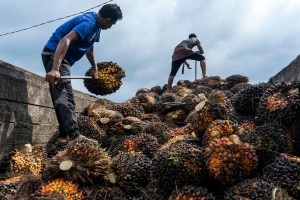
All eyes are on Indonesia ahead of the Group of Twenty leaders’ summit in November. The gathering will bring together the world’s major economic players, representing two-thirds of the world’s population and three-quarters of international trade. This makes it a critical platform to advance sustainable practices in business and, in particular, greater respect for human rights across all areas of business.
Palm oil is among Indonesia’s most important exports and its industry is one of the most significant employers. By some estimates, around 21 million people are involved in the industry either directly or indirectly. This figure has increased exponentially as global demand for palm oil has surged. Today, it is the world’s most widely traded and used edible vegetable oil.
But this status comes at a price.
Recent reports suggest a worrisome uptick in exploitative labor practices in the industry. The US State Department has long linked the palm-oil industry to human trafficking, child labor and other forms of modern slavery. It is one of the reasons for downgrading Malaysia to the lowest ranking in its latest human trafficking report, where it languishes with the likes of North Korea and Eritrea.
Like many other globally traded agro-commodities, palm-oil supply chains are increasingly complex, making it particularly challenging to eliminate labor and human-rights violations.
Understanding the risks
Global controversy surrounding palm oil has largely focused on its links to deforestation and climate change, but we cannot achieve a fully sustainable supply chain without a comprehensive approach to worker protection.
Laborers on oil-palm plantations are often recruited from the most vulnerable and marginalized populations, such as migrants or indigenous communities.
Studies suggest that unethical recruitment practices and excessive recruitment fees are not uncommon. The financial burden can leave workers in situations of debt bondage or other forms of forced labor. These groups often have no access to legal or political recourse under such circumstances.
Low education levels of workers and the geographic isolation of plantations further exacerbate their vulnerability, amplifying the risk of exploitation.
Corporate respect for human rights
In recent years, debate on the protection of human and labor rights has focused on mandatory due-diligence legislation as the only effective solution. In this context, voluntary initiatives are often overlooked or dismissed. But we need both to be truly successful.
Voluntary initiatives present an opportunity to test and create scalable solutions, especially in collaboration with industry players and other stakeholders. They also allow for learning, knowledge exchange and capacity-building around complex issues. Voluntary initiatives offer complementarity to due-diligence legislation and government policies in terms of monitoring, implementation, and enforcement.
If we look at environmental governance, we can see successful partnerships among governments, private companies and non-governmental organizations (NGOs) that have changed the global approach to environment protection. The Forest Stewardship Council and Marine Stewardship Council are two notable examples. As market-based instruments for forestry and fishery governance respectively, they have been instrumental in bringing an end to unsustainable practices.
But standards are only as good as the extent of implementation.
For example, at the Roundtable for Sustainable Palm Oil, monitoring of member plantations is a top priority, where palm-oil producers are certified through strict verification of the production process to the RSPO principles and criteria by accredited certifying bodies.
Governments should build on voluntary initiatives from the private sector by strengthening the implementation and enforcement of labor laws. Businesses must be legally obligated to take their responsibilities seriously if we are ever going to halt social injustice in supply chains.
Driving sector-wide transformation
An open and transparent discussion of these issues points to the important contribution of voluntary initiatives, and enables us to encourage more growers, including smallholders, to adopt our standards.
Businesses and governments have strong economic and reputational incentives to act, especially when they are dependent on global supply chains and consumers who are increasingly sensitized to these issues.
Responsible leaders know that sustainable growth can only stem from environments where people have dignity, equality and freedom.
The G20 forum in Bali will be an important opportunity for Indonesia to take the lead in discussions on how to marry the pursuit of economic growth with the protection of human rights. Such an approach will underpin investor confidence and consumer preference.
And when it comes to palm oil, a sustainable and equitable industry will bring greater benefits not only to the Indonesian economy and environment but to its people, too.

